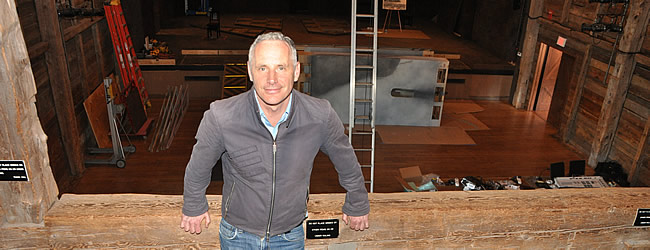Living
Laughs in the libretto
New Wolf Trap-commissioned opera ‘The Inspector’ debuts next week

‘The Inspector’
A world-premiere opera based on Gogol’s play ‘The Inspector General.’ Music by John Musto, book and libretto by Mark Campbell. April 29 at 8 p.m. and May 1at 3 p.m.
Free one-hour talk at the Center for Education, next door to The Barns, an hour prior to each two-hour show.
The Barns at Wolf Trap
1645 Trap Rd., Vienna, VA
Tickets: $32-$72
877-965-3872/wolftrap.org
Comedy is a different animal when it comes to opera.
That’s the experience of Mark Campbell, author of a new comic opera, “The Inspector,” that features his laugh-out-loud, incisive libretto matched perfectly to the expressive melodies in composer John Musto’s sophisticated-yet-fun style. It comes to the stage in its world premiere at The Barns at Wolf Trap on three nights beginning Wednesday.
Based on all advance indications, it will be another triumph for the veteran collaborators, Campbell and Musto, whose comic operas “Volpone” won major plaudits at Wolf Trap in 2004 and returned there for a successful reprise in 2007.
“We were their matchmakers,” Kim Witman, Wolf Trap Opera’s director, rightly boasts, about bringing the two together for “Volpone,” and she admits that “anytime you do that, you just don’t know at the beginning what’s going to work or not.”
This combo worked so well, says Witman, “that we’ll take the credit” for making it happen. About “The Inspector,” she says, “They both have an approach to this work that is modern in feeling, not as in avant-garde” — which in opera can be cold and remote — “but that hits the sweet spot.”
“The Inspector,” an update of the 1836 classic tongue-in-cheek satirical play by Russian writer Nikolai Gogol, “intersects as music and words,” she says, “with its own spin on our contemporary world, because this is not about high art, but they each set out to entertain.”
What’s great about the two, she adds, is that “they use actual English words and the same syntax you would use if you spoke to someone on the street, so it doesn’t feel theatrical, it just sounds familiar,” in Campbell’s way with words and Musto’s melodic punctuation.
Witman, an old hand at making opera come alive for new audiences, admits that “We’re hampered by the fact that we are called opera,” but she stresses, “in many ways ‘The Inspector’ is really musical theater. It’s simply that it’s sung by people with operatically trained and expressive voices, without microphones.” She points out that on Broadway, singers’ voices are amplified, but not in opera. “That’s what makes it opera,” but with “The Inspector,” she says, “in everything else it could just as easily be musical theater.”
Opera is alienating to some, she says.
“Many people won’t come out to anything called opera, because they think they’ll feel stupid or that it’s stupid because they can’t understand it. It’s because of the trappings of opera, the exaggerated posturing, that people stay away, and because it’s in another language, so people think ‘I won’t understand it,’ and because they think it’s going to be five hours long.”
But “The Inspector” is sung in English, with constant wisecracks, and she says, “is very fast,” clocking in at just two hours long.
Campbell — who is gay, and openly declares, “I’m single and available for marriage, unfortunately not yet in New York (he lives in New York City), but in D.C.” — says that he and Musto “were told to write a comedy because they (Wolf Trap) loved ‘Volpone,'” which was based on the English play of that name (in Italian it means “sly fox”) written by Ben Jonson and first produced in 1606.
Musto is Italian — half Sicilian and half Neapolitan — so Campbell says that when they put their heads together they soon decided to revamp and relocate the classic Gogol comedy, set in Tsarist Russia, to Mussolini-era Italy, and instead of Russian-flavored music, Campbell says it is very Italian in flavor, with tarantellas, those Italian folk dances with fast upbeat tempos, not cossack-style dances.
“The composer must help make the opera funny,” and all of Musto’s music, says Campbell, is created to make sure that the comedy of the libretto — the words — lands with flair and funny impact.
This is their fourth opera together. Three are comedies, and the fourth, says Campbell, has comic elements — “Later The Same Evening,” based on the paintings of American artist Edward Hopper.
“When it comes to comedy, we know how to do this,” he says.
That doesn’t mean it’s easy.
“It’s harder to do than drama, because it must do the same thing that drama does, create clear characters who want something, the same thing as when you tell any story, but it must also be funny.”
Campbell says that “you’d have to ask my friends if I’m funny” but that he thinks that he’s “actually a pretty miserable person, as are most people who have a comic bent, because at the core of their heart is something that’s pretty dark.”
Soprano Anne-Carolyn Bird, who sings the role of the mayor’s daughter, Beatrice, in “The Inspector,” agrees. She has worked with Campbell before, in the 2007 revival of “Volpone,” when she also sang on the cast recording of it which was nominated for a Grammy.
“He’s very friendly,” she says, “but at the same time he’s very private, and a lot of artists are like that.”
“We know how to bond with people, but we save ourselves for a few people and put the rest into our art,” so she says that “you get to know more about Mark by reading his work than by spending time with him in a casual setting.”
And “The Inspector” is funny, albeit set in a dark time, in late 1920s Sicily, when the new Italian dictator, Benito Mussolini, the fascist leader, or “Il Duce,” decided to try to clean up the inbred corruption on the island with its Mafia-style gangs that ruled in politics and society with a heavy hand of thuggery and thievery.
“His ego had been hurt,” says Campbell, who spent a long time researching the history of the period, “so he sent in his own inspectors — called “prefetti,” or prefects — to clean up the corruption in local power centers on the island. So the scene is set for the village (imaginary but based on his research) of Santa Schifezza, whose local mayor’s rule is both criminal and unchallenged, until someone the mayor (Fazzobaldi) believes to be Mussolini’s inspector arrives.
Tancredi, this mysterious stranger, traveling with his manservant Cosimo — exceedingly smart, acerbic even, and definitely more pragmatic than his “master” — arrive just as the citizens of Santa Schifezza have gathered to rehearse the town’s new anthem — which is so bad it’s utterly funny — for the next day, Municipal Mayor Day, a day Mayor Fazzobaldi has instituted in honor of himself.
But the mayor has been informed that an inspector from Rome will soon arrive, incognito, and put at risk the entire way of life, based on corruption, he has worked so hard to keep going. When the goofy twins, Bobachina and Bobachino, who run the post office, stumble in with the news that they have spotted a new arrival at the inn, and that he is tall, eloquent, elegant — and blond — the mayor immediately jumps to the conclusion that he must be the anticipated inspector.
“Comedy as a form of theater is different from humor,” says Campbell, born in D.C. and a Maryland resident until age 12. “In opera it’s usually found,” he says, “when characters are so obsessed with something — with greed or in the case also with abuse of power — that audiences don’t find it sad but funny.”
But he says his own favorite moments in comic operas are the sad or tragic moments, such as in the character of Figaro from the Beaumarchais play which formed the basis for Mozart’s opera “The Marriage of Figaro” and Rossini’s opera “The Barber of Seville.”
“I have done my job,” Campbell says, “if I have first seduced people with the jokes and then pull a 180-degree turn and stop them dead in their tracks, surprising them with an incredibly sad moment. Opera allows you to do that, and in many other art forms you just can’t do this so efficiently, because it has music which allows you to cut to the chase faster than with mere language.”
Campbell, who wrote the funny lyrics to the musical “And The Curtain Rises,” which just closed its world-premiere run at the Signature Theatre in Arlington, has also just come from Norfolk, Va., where the Virginia Opera premiered this month his musical theater piece based on a Civil War theme, “Rappahanock County,” in collaboration with the composer Ricky Ian Gordon, who is also gay and whose own musical “Sycamores” premiered last year at Signature Theatre.
Campbell is philosophical about being single, having been, he says, “in several long-term relationships, which were fairly happy ones, but I am not someone who believes in love forever, because people change and can evolve into a relationship and then evolve out of it.”
Three of his former partners “are now among my best friends,” he says. “If you love someone, you want them to be happy, and if you’re truly invested with someone it’s just a matter of reformatting the relationship.” But he’s also realistic — because first “you must get past the awkwardness of the first couple of years and the first new boyfriends.”
Could a comic opera on the subject be far behind?
Advice
How to cope when a partner gives you the silent treatment
Punishing behavior brings up memories of parent’s mistreatment

Michael,
My wife and I met less than two years ago and we were crazy about each other from the start. We wanted to spend life together so we just went for it. Maybe this wasn’t the most well-thought out decision on either of our parts but we thought that love conquers all.
But lately we’ve been arguing. The stuff we’re fighting about is never such a big deal: chores, or spending, or wanting to do different things on the weekend. But when I don’t want to go along with Michelle’s point of view, she gets angry and shuts down. Sometimes she stops talking to me for as long as a few days.
This is painful for me. My mom used to pull this stunt when I was a kid and she was mad at me. She also cut me off when I came out. We’re still estranged.
Michelle has a whole different take on this. She says I am being “mean” to her (when I don’t go along with what she wants) and this is painful, and she has to “take a break” to cool off.
I know she comes from a volatile family. She has told me there was a lot of screaming in her house, and she barely has a relationship with her parents as a result. So I get that she’s sensitive to conflict.
But I don’t think I’m being mean to her by standing up for what I want — certainly not enough to warrant her giving me the silent treatment.
We got married to have a great life together. We often do but I can’t live with someone who just shuts me out when she’s annoyed with me.
If I became a doormat and went along with everything she wants and never pushed back or complained, maybe she wouldn’t shut down. But I don’t want to do that.
I’d appreciate some ideas to improve the situation. I don’t want a divorce but I also don’t want to keep being mistreated.
Michael replies:
You can think of marriage — or any serious relationship — as a gym where you have ongoing opportunities to become an increasingly resilient person in the face of the ongoing challenges that an intimate relationship poses.
Your task here is to shift your focus toward figuring out how to handle yourself well, even in the awful circumstance of getting the silent treatment.
Michelle is not under an obligation to behave as you’d like her to. You can certainly ask her to stop withdrawing when she’s angry at you. But that doesn’t mean she is going to honor your request.
I well understand that Michelle’s punishing behavior is bringing up painful memories of your mother’s mistreatment. But if she doesn’t change her behavior, you have to find a way to live with Michelle as she is, with as much equanimity as you can muster, for as long as you choose to be married to her. If she does not change and you find her behavior to be unbearable, you can leave.
Every time she shuts down, Michelle is handing you an opportunity to figure out how you, yourself, can deal with feeling hurt and let down, rather than depending on someone else to behave as you’d like her to, or not upset you, or soothe you. Being in charge of your own mood rather than letting someone else press your buttons is a great skill to get better at.
I’m not going focus on what techniques you might use to soothe yourself — that’s a different column (or even better, a number of therapy sessions). That said, knowing that Michelle’s behavior comes from her history might help you to take it less personally. And, simply keeping in mind that living with a difficult spouse is unavoidable and worth getting better at may help you to quiet yourself down.
Another challenge that your marriage is pushing you to work on: Discerning when you can be generous, and when it is important to have a boundary. Of course, I understand that you don’t want to be a doormat by going along with whatever Michelle says and wants. But is it possible that she has a point, in that you could stand to lean more in her direction?
None of us get to have everything the way we want when we are in a relationship (much less in life). Figuring out the interplay between generosity and boundary is complicated. It often involves considering what is important to your partner; and deriving joy from her getting some of what is important to her, not only from your getting what you would like. And of course, it also involves figuring out what is most important to you.
If you set a boundary thoughtfully, because something is important to you, and Michelle doesn’t like it, you’re being handed an opportunity to get better at tolerating disappointment. Being a disappointment to your partner, and being disappointed in your partner, are both unavoidable parts of marriage: We’re all different, and at times will make choices that the other person really does not like.
If we make our decisions from a place of integrity rather than whim, entitlement, anger, or “whose turn it is”, and strive to honor the choices that our partners make from a place of integrity, this often makes the disappointment easier to bear.
Of course, it would be great if Michelle would join you in working to become a more solid and resilient spouse. As I mentioned earlier, you can’t persuade her to do so. But you can certainly tell Michelle what you are working on and ask her to consider how she, too, might use your relationship difficulties as a challenge to grow.
It isn’t easy to have such a conversation without sounding condescending. You are better positioned to do so when you are walking the walk, not just talking the talk. One good rule of thumb is to put you and your partner in the same boat, making it clear that you see the two of you as facing the same challenges, rather than positioning yourself in a superior position. Another is to initiate the conversation when you are both calm, rather than in the middle of a fight or when you’re getting the silent treatment.
One more point: If Michelle is willing, I’d suggest that you propose couples therapy as an opportunity for you two to collaborate on building a consistently loving relationship where neither of you lets your reactivity run the show.
Michael Radkowsky, Psy.D. is a licensed psychologist who works with couples and individuals in D.C. He can be found online at michaelradkowsky.com. All identifying information has been changed for reasons of confidentiality. Have a question? Send it to [email protected].

Electric-vehicle tax credits may have faded earlier this year, but EVs themselves are far from losing their spark. There are more charging stations than ever, battery ranges are longer and more realistic, and automakers have finally figured out that EVs don’t all need to look like geeky science projects or feel like failed beta tests.
Just look at these two compact electrics, which are futuristic, fun and flexible enough for work or play.
HYUNDAI IONIQ 5
$37,000 to $48,000
Range: 245 to 318 miles
0 to 60 mph: 4.5 to 7.4 seconds
Cargo space: 26.3 cu. ft.
PROS: Fast charging. Roomy cabin. Silky-smooth suspension.
CONS: Wide turning radius. Rear wiper not on all trims. Price creep.
After being introduced three years ago, what’s new for the latest Hyundai Ioniq 5? Mostly refinement. Charging is quicker, software is smarter and Hyundai continues to quietly listen to feedback, tweaking ride comfort and usability. Think of it as switching from messy eyeliner to a perfectly sharp wing.
Exterior styling remains one of this EV’s biggest conversation starters. Those pixel-inspired lights, crisp lines and slick hatchback-meets-crossover proportions exude refreshing confidence. There’s no trying to blend in, and that’s the point. Park this Hyundai anywhere and heads will turn.
On the road, the Ioniq 5 prioritizes calm over chaos. Steering is light, the suspension smooths out rough pavement and acceleration feels brisk without being aggressive. Safety tech is plentiful and well-calibrated—adaptive cruise control, lane-centering, blind-spot monitoring—all working together without seeming like a nervous backseat driver. IOW, this ride is supportive, not clingy.
Inside, the user-friendly cabin shines. The flat floor and long wheelbase create a lounge-like atmosphere, with excellent legroom and airy visibility. Seats are well-bolstered and available with eco-friendly materials, and the sliding center console adds flexibility. Cargo space is generous, and the wide windshield makes city driving stress-free. Alas, the rear wiper is only available on select models. Overall, though, I appreciated how everything looks modern without feeling cold.
What makes this Hyundai special is its vibe. An EV that embraces individuality without shouting about it.
Fun fact: The Ioniq’s ultra-fast charging can add hundreds of miles in under 20 minutes—perfect for those who hate waiting almost as much as they hate small talk on awkward first dates.
VOLKSWAGEN ID.4
$46,000 to $59,130
Range: 206 to 291 miles
0 to 60 mph: 4.4 to 7.7 seconds
Cargo space: 30.3 cu. ft.
PROS: Sure handling. Decent range. Good storage.
CONS: Body roll in curves. Fussy infotainment. No frunk.
The latest VW ID.4 focuses on polish. Software updates have fixed earlier frustrations, and overall drivability feels more cohesive. Less “learning curve” and more “hop in and go,” like a dependable bestie who doesn’t overthink things.
Styling-wise, this EV is intentionally inoffensive. Soft curves, friendly lighting and a familiar crossover shape make it approachable. While the ID.4 won’t turn heads like the Ioniq 5, that’s OK. It’s more akin to a classic outfit that always works—timeless, not trendy.
Driving the ID.4 is relaxed and predictable. This SUV prioritizes comfort over thrills, with a suspension tuned for daily commuting and long highway drives. Safety features are comprehensive and reassuring, including excellent lane assistance and collision-prevention systems. It’s the kind of car that quietly has your back, no drama required.
Inside, the ID.4 offers a calm, uncluttered cabin with good space for passengers and cargo alike. Rear-seat legroom is especially strong, making it a solid road-trip companion. The seats are plush, visibility is good and while the infotainment system isn’t the most intuitive, it’s improved enough to be more than tolerable.
The ID.4’s special sauce is balance. It doesn’t try to reinvent the wheel—it just electrifies it.
Fun fact: This is one of the most globally popular EVs, proving that sometimes being universally liked is a strength, not a personality flaw. Think, gold star gay who still surprises you.

Real Estate
Child- and pet-proofing your home for the holidays
It isn’t about being perfect but about being prepared

The holidays are meant to be joyful, cozy, and full of laughter — but if you have young children or pets, they can also feel a little chaotic. Twinkling lights, shiny decorations, guests coming and going, and tables full of tempting food can turn your home into a wonderland of curiosity and mischief. The good news? With a little thoughtful planning, you can keep the holiday magic alive while making your home safer for everyone who lives there.
There’s something oddly comforting about movies where animals go to war with holiday decorations, turning carefully strung lights and perfectly placed ornaments into chaos. Whether it’s a mischievous dog tangled in tinsel or a curious cat launching a full-scale assault on a Christmas tree, these scenes tap into a universal experience for pet owners.
The humor comes from the contrast: the human characters are trying to create warmth, tradition, and picture-perfect cheer, while the animals see the decorations as toys, obstacles, or personal enemies. The resulting destruction — trees tipping over, ornaments shattering, lights blinking out—feels exaggerated but relatable, especially during the already hectic holiday season.
Let’s start with decorations because they tend to be the biggest attraction. Ornaments sparkle, garlands dangle, and everything seems designed to be touched, pulled, or tasted. If you have little ones or pets, consider placing your most fragile ornaments higher on the tree and using shatterproof options on the lower branches. Tinsel and ribbon may look festive, but they can be dangerous if swallowed, so skipping them or keeping them well out of reach is a simple way to reduce risk without sacrificing style.
Holiday lights are another favorite fascination. Before hanging them, take a few minutes to inspect each strand for frayed wires or broken bulbs. Secure cords along walls or behind furniture so they’re harder to grab or chew and unplug them when you leave the house or head to bed. Not only does this help prevent accidents, but it also gives you one less thing to worry about during a busy season.
The Christmas tree itself can become a focal point for exploration. Make sure it’s sturdy and well-anchored so it doesn’t tip if a toddler tugs on a branch or a pet decides to investigate. If you use a real tree, cover the water base since tree water can contain additives that aren’t safe if consumed. For artificial trees, keep an eye out for loose pieces or needles that could become choking hazards.
Food is a big part of holiday celebrations, and it’s also one of the most common sources of trouble. Many traditional treats—like chocolate, grapes, raisins, alcohol, and foods containing xylitol—are dangerous for pets. Keep plates and serving dishes up high, secure the trash can, and gently remind guests not to slip pets or kids “just a little bite” without checking first. For children, be mindful of hard candies, nuts, and small treats that could pose choking risks.
Candles and fireplaces add warmth and charm, but they deserve extra caution. Flameless candles are a wonderful alternative if you want ambiance without worry. If you do use real candles, place them well out of reach and never leave them unattended. Fireplaces should always have a sturdy screen or gate, especially with crawling babies or curious pets nearby.
Holiday gatherings bring wonderful energy into your home, but they can also create new challenges. Doors opening frequently make it easier for pets to slip outside, so consider setting up a quiet, comfortable space where they can relax during busy get-togethers. This can help reduce stress for them and give you peace of mind. For children, stair gates, locked cabinets, and clear boundaries can help prevent accidents when there’s extra excitement in the air.
New toys and gifts are another thing to watch closely. Packaging, twist ties, plastic wrap, and especially button batteries should be cleaned up promptly. These items are easy to overlook in the excitement of gift-opening but can be dangerous if swallowed. Taking a few minutes to tidy up as you go can make a big difference.
Lastly, try to keep routines as steady as possible. The holidays naturally disrupt schedules, but familiar mealtimes, naps, walks, and bedtime rituals help children and pets feel secure. A calmer household often means fewer accidents and a happier experience for everyone.
At the end of the day, child- and pet-proofing your home for the holidays isn’t about being perfect but about being prepared. A few small adjustments can help you relax, enjoy your guests, and focus on what truly matters: creating warm, happy memories with the ones you love. When your home feels safe, the holidays feel even sweeter.
Valerie M. Blake is a licensed Associate Broker in D.C., Maryland, and Virginia with RLAH @properties. Call or text her at 202-246-8602, email her at [email protected] or follow her on Facebook at TheRealst8ofAffairs.





















